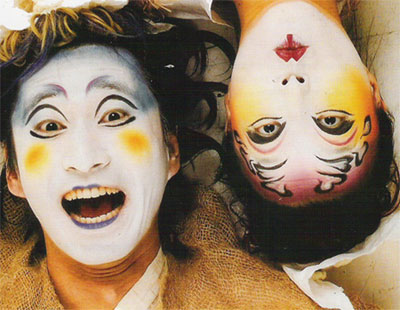
A Korean
Midsummer Night
Joseph Mutti
September 20, 2005
La Jiribilla
http://www.lajiribilla.cu/2005/n229_09/229_09.html
Very few of us
understood them – except for the odd Spanish word thrown in for fun – but the
Korean Yohangza Theater Company received a ten minute standing ovation from the
full house at the Mella Theater in Havana at the end of their version of A
Midsummer Night’s Dream during the Havana Theatre Festival.

Shakespeare’s play was never so lively or so magical. There’s something for everyone – singing, dancing, acrobatics, comedy, rude sounds, and live Korean musical accompaniment. The choreography is complicated and performed to perfection. The visual effects are sometimes stunning - and at all times compelling - as the story unfolds of crossed love, futile quarrels, and spells in the woods where two couples are first teased, then helped by impish fairies.
The company’s director, Yang Jung-ung, uses very effective minimal stage props to compliment the extensive, yet delicate, make-up and facial expressions that typify Korean theatre. The actors all enter and exit by way of two well-lighted rectangular frames draped with white curtains that stand at either side of the musicians who perform using traditional Korean instruments in half-light at floor level. The music, composed by Kim Eun Jeong, is simple and evocative. The masks, costumes and headdresses might have been used for this play by Shakespeare himself, they were so appropriate to the theme of enchantment and mischievousness. The play itself has been adapted to cater to Korean folklore and in this context the players begin and end the production by presenting themselves in a circle that moves and stops, moves and stops, with each character frozen in a facial and corporal grimace.
The company had obviously spent time learning some Spanish lines as well as a little of Cuban culture. A comment about picadillo de soja (a much-hated health food brought on by Cuba’s economic crisis in the early 1990s) brought the house down, and the odd word such as “mi esposa” kept us informed as to the dynamics that existed between the main characters.
Yang Jung-ung's direction is inspirational – it had to be to keep a theatre full of Cubans engrossed for an hour and a half without understanding a word of Korean. There were plenty of moments of interaction with the audience, including a moment when an unfortunate was brought up on stage to be annoyed by the characters presumably playing Puck and Bottom. The evening was made even more evocative by the midsummer night’s heat of the Mella Theater’s weak air-conditioning.
All in all an exquisite experience.
|
|
|